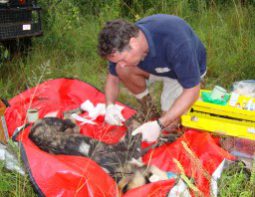Rolling up his sleeves for African painted dogs
16/10/2011
Five mobile clinics were set up in villages around the park and up to 450 domestic dogs were vaccinated against distemper and rabies, with Brig. Ogilvie Graham working alongside a Government vet and his staff. Rolling up his sleeves to treat injured painted dogs was the highlight of a Zimbabwe mercy mission for head of the Royal Army Vet Corps Brigadier Tom Ogilvie Graham – especially saving the life of a pack leader. Rolling up his sleeves to treat injured painted dogs was the highlight of a Zimbabwe mercy mission for head of the Royal Army Vet Corps Brigadier Tom Ogilvie Graham – especially saving the life of a pack leader.

The WVI Trustee was there to help tackle a 2010 outbreak of canine distemper in the domestic dog population surrounding Hwange National Park. The outbreak represented a direct threat to the park’s African painted dogs, or wild dogs. Already fighting for survival in the face of Zimbabwe’s worsening political situation, the country’s collapse in eco-tourism and conservation and snaring by local people for bushmeat, the painted dogs now faced serious risk of deadly disease transmission. In partnership with MSD Animal Health and with a grant from RCVS Trust, WVI responded rapidly, sending a vet and vaccine to work with staff from the Painted Dog Conservation Project’s (PDCP) veterinary and rehabilitation centre created in 2007. Five mobile clinics were set up in villages around the park and up to 450 domestic dogs were vaccinated against distemper and rabies, with Brig. Ogilvie Graham working alongside a Government vet and his staff. They also dressed wounds and treated dogs for parasites and Brig. Ogilvie Graham treated broken legs, skin conditions and a dog bitten down to the liver by a baboon. He also treated painted dogs, including one with a recent forelimb amputation and another badly injured alpha male pack leader, whose survival is critical to pack survival. The dog was tracked from his radio collar, darted and anaesthetised and found to have a serious maggot-ridden infection above his elbow. The wound was treated, allowing the dog to join his waiting pack. He recovered, but his death in a snare in 2011 graphically illustrates the precarious lives of painted dogs. MSD Animal Health (formerly Intervet Schering Plough) provided vaccine and working tablets, Novartis Animal Health UK provided the ectoparasite treatment and Millpledge the clinical equipment. Painted dogs were not vaccinated as side effects of the vaccines are unknown. Domestic dogs are also safer to handle and, importantly, the clinics provided a service to villagers around the national park in the name of the painted dog.
.png)
.png)

.png)
.png)







.png)






.png)
.png)




.png)


